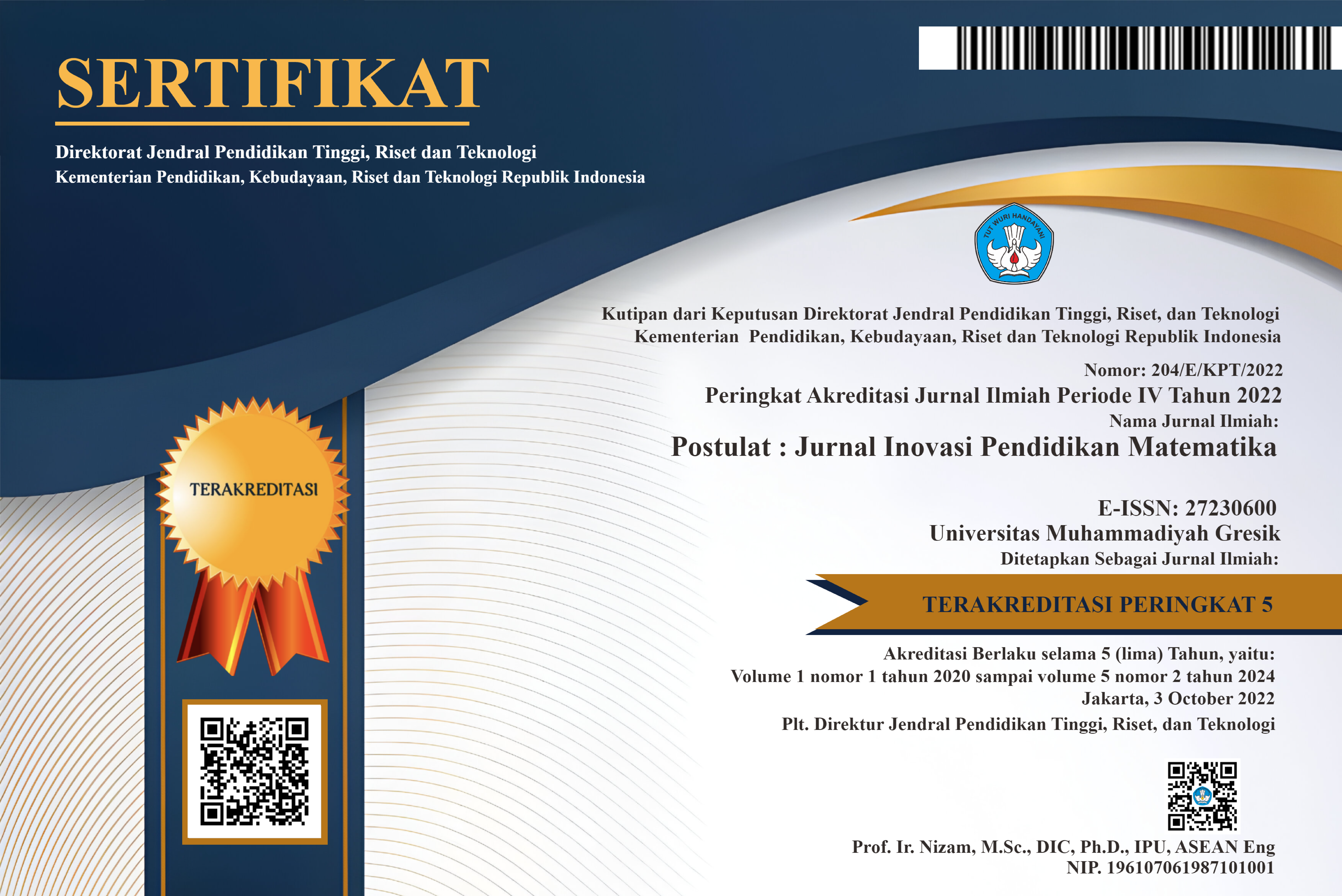Problems of Mathematical Problem Solving for Grade VIII Students in Circle Material
DOI:
https://doi.org/10.30587/postulat.v6i1.9621Keywords:
Problem Solving; Mathematic Learning; CirclesAbstract
The ability to solve mathematical problems is one of the main competencies that need to be mastered in mathematics learning. However, a number of studies reveal that students still experience obstacles in solving math problems, especially on the topic of circles. The purpose of this study is to explore the various causes of difficulties of grade VIII students in solving mathematical problems related to circle material and offer alternative solutions that can be used in the learning process. This research was conducted with a descriptive qualitative approach through a case study of several junior high school students in grade VIII. The findings of this study show that the main obstacles for students lie in the lack of understanding of the basic concept of circles, errors in the use of formulas, and limitations in designing problem-solving steps. Therefore, problem-based learning strategies and contextual learning approaches are recommended to be implemented to support improved student understanding.
References
Agustina, R. (2016). Kesalahan siswa dalam menyelesaikan soal lingkaran pada ujian nasional. Jurnal Pendidikan Matematika, 10(2), 45-56.
Anderha, & Maskar. (2021). Matematika sebagai ilmu abstrak dan tantangan pembelajarannya. Jurnal Pendidikan Matematika, 12(1), 33-45.
Anderson, J. (2009). Problem-solving in mathematics education: Singapore’s model and beyond. International Journal of Mathematics Education, 3(1), 22-35.
Afsari, et al. (2021). Peranan matematika sebagai ibu dari segala ilmu dalam pendidikan. Jurnal Kajian Pendidikan Matematika, 5(2), 102-115.
Armanto, D. (2000). Pembelajaran berbasis masalah dalam pendidikan matematika di Indonesia. Prosiding Konferensi Nasional Matematika, 78-89.
Boaler, J. (2016). Mathematical mindsets: Unleashing students' potential through creative math, inspiring messages and innovative teaching. Jossey-Bass.
Cahyaningsih, R., Rahayu, S., & Hidayat, A. (2023). Efektivitas pembelajaran berbasis masalah terhadap kemampuan pemecahan masalah siswa. Jurnal Inovasi Pendidikan Matematika, 7(3), 112-124.
Clements, D. H., & Battista, M. T. (1992). Geometry and spatial reasoning in young children. Educational Studies in Mathematics, 23(1), 33-55.
Clements, D. H., & Sarama, J. (2019). Learning and teaching early math: The learning trajectories approach (2nd ed.). Routledge.
Gonzalez, P., Gutierrez, M., & Herrera, L. (2020). Misconceptions in mathematics: Understanding students' difficulties in problem-solving. Mathematics Education Journal, 15(2), 89-103.
Greeno, J. G. (2006). Learning in activity. Educational Researcher, 35(5), 22-29.
Hiebert, J., Carpenter, T. P., Fennema, E., Fuson, K. C., Wearne, D., Murray, H., & Human, P. (1996). Problem solving as a basis for reform in curriculum and instruction: The case of mathematics. Educational Researcher, 25(4), 12-21.
Hikmah, N. (2018). Kesulitan siswa dalam memahami konsep geometri lingkaran: Studi kasus pada kelas VIII SMP. Jurnal Pendidikan dan Pembelajaran Matematika, 6(1), 45-60.
Jonassen, D. H. (2011). Learning to solve problems: A handbook for designing problem-solving learning environments. Routledge.
Kennedy, M., Tipps, S., & Johnson, A. (2008). Guiding children’s learning of mathematics (11th ed.). Wadsworth Publishing.
Kilpatrick, J., Swafford, J., & Findell, B. (2001). Adding it up: Helping children learn mathematics. National Academy Press.
Kim, D., Park, S., & Lee, J. (2022). Problem-based learning in mathematics education: Effects on students' problem-solving skills and conceptual understanding. Journal of Mathematics Education, 28(4), 321-340.
Latifah, N. (2021). Analisis kemampuan pemecahan masalah matematis siswa pada materi lingkaran di SMP. Jurnal Riset Pendidikan Matematika, 8(2), 134-145.
Lester, F. K. (2013). Thoughts about research on mathematical problem-solving instruction. The Mathematics Educator, 22(1), 33-50.
Mayer, R. E. (2002). Rote versus meaningful learning. Theory Into Practice, 41(4), 226-232.
Muderawan, I. W., Sudarma, K., & Winaya, I. M. (2019). Pengaruh lingkungan belajar terhadap prestasi siswa dalam matematika. Jurnal Pendidikan dan Teknologi, 5(2), 77-89.
Muntaha, M., Sari, N., & Hakim, R. (2020). Implementasi pembelajaran kontekstual dalam meningkatkan pemahaman konsep matematika siswa SMP. Jurnal Pendidikan Matematika, 14(2), 100-115.
National Council of Teachers of Mathematics (NCTM). (2000). Principles and standards for school mathematics. Reston, VA: NCTM.
OECD. (2018). PISA 2018 results: What students know and can do. OECD Publishing.
Putri, D. E., Rahman, A., & Widodo, S. (2021). Analisis kesulitan siswa dalam memahami konsep lingkaran di SMP. Jurnal Kajian Pendidikan Matematika, 9(3), 178-190.
Rahman, H. (2019). Kesulitan siswa dalam pemecahan masalah matematika dan upaya perbaikannya. Jurnal Inovasi Pendidikan, 6(2), 56-72.
Ruhyana, H. (2016). Kesalahan siswa dalam menyelesaikan soal geometri menggunakan teorema Pythagoras. Jurnal Pendidikan Matematika, 12(2), 88-99.
Sugiman, A., Kusumah, Y. S., & Sabandar, J. (2012). Analisis kesalahan siswa dalam pemecahan masalah PISA matematika. Jurnal Pendidikan Matematika, 8(1), 34-47.
Suharta, I. M. (2002). Strategi pembelajaran matematika berbasis pemecahan masalah. Jurnal Pendidikan Matematika, 5(2), 23-35.
Susanti, D. (2024). Analisis Analisis Kemampuan Pemecahan Masalah Peserta Didik dalam Menyelesaikan Masalah Kontekstual : Tinjauan Self Efficacy: Tinjauan Self Efficacy. Postulat : Jurnal Inovasi Pendidikan Matematika, 5(1), 30–39. https://doi.org/10.30587/postulat.v5i1.8173
Tyas, R. (2016). Analisis kesalahan prosedural siswa dalam menyelesaikan soal matematika SMP. Jurnal Pendidikan Matematika, 11(1), 50-62.
Zbiek, R. M., Heid, M. K., Blume, G. W., & Dick, T. P. (2007). Research on technology in mathematics education: A perspective of constructs. In F. K. Lester (Ed.), Second Handbook of Research on Mathematics Teaching and Learning (pp. 1169-1207). National Council of Teachers of Mathematics.
Zulkardi, Z. (2005). Realistic Mathematics Education (RME) dalam pembelajaran matematika di Indonesia. Jurnal Pendidikan Matematika, 3(2), 20-31.











